Decolonial Anthropology: Exploring Colonialism's Enduring Impact
VerifiedAdded on 2023/06/03
|6
|1517
|174
Essay
AI Summary
This essay delves into the realm of decolonial anthropology, examining the enduring impact of colonialism and neocolonialism on various parts of the world. The author explores the concept of decolonization, which gained prominence after World War II, and analyzes five key works by prominent writers like Leanne Betasamosake Simpson, Kristen L. Simmons, Kaya Naomi Williams, Eve Tuck, K. Wayne Yang, and Katherine McKittrick. These works shed light on the experiences of Indigenous and subaltern populations whose lands and resources were seized by colonizers. The essay discusses themes of injustice, brutality, and the complexities of decolonization, including the challenges of neocolonialism. The author emphasizes the importance of understanding the rights and powers of Indigenous people and critiques the biased attitudes of some researchers. The essay concludes with the idea that the shadows of decolonization still linger, and addressing this problem requires a deeper understanding of the issue from all parties.
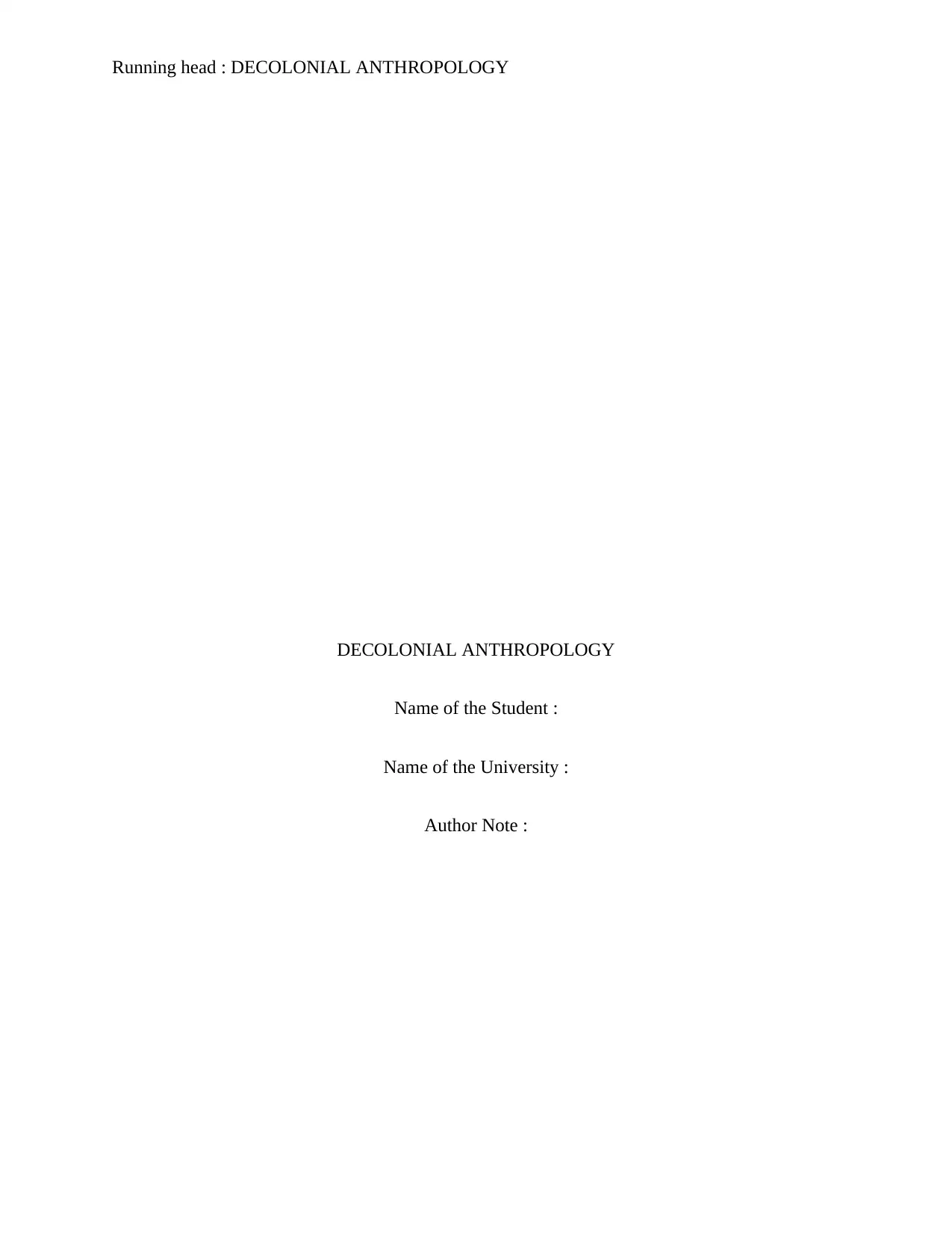
Running head : DECOLONIAL ANTHROPOLOGY
DECOLONIAL ANTHROPOLOGY
Name of the Student :
Name of the University :
Author Note :
DECOLONIAL ANTHROPOLOGY
Name of the Student :
Name of the University :
Author Note :
Paraphrase This Document
Need a fresh take? Get an instant paraphrase of this document with our AI Paraphraser
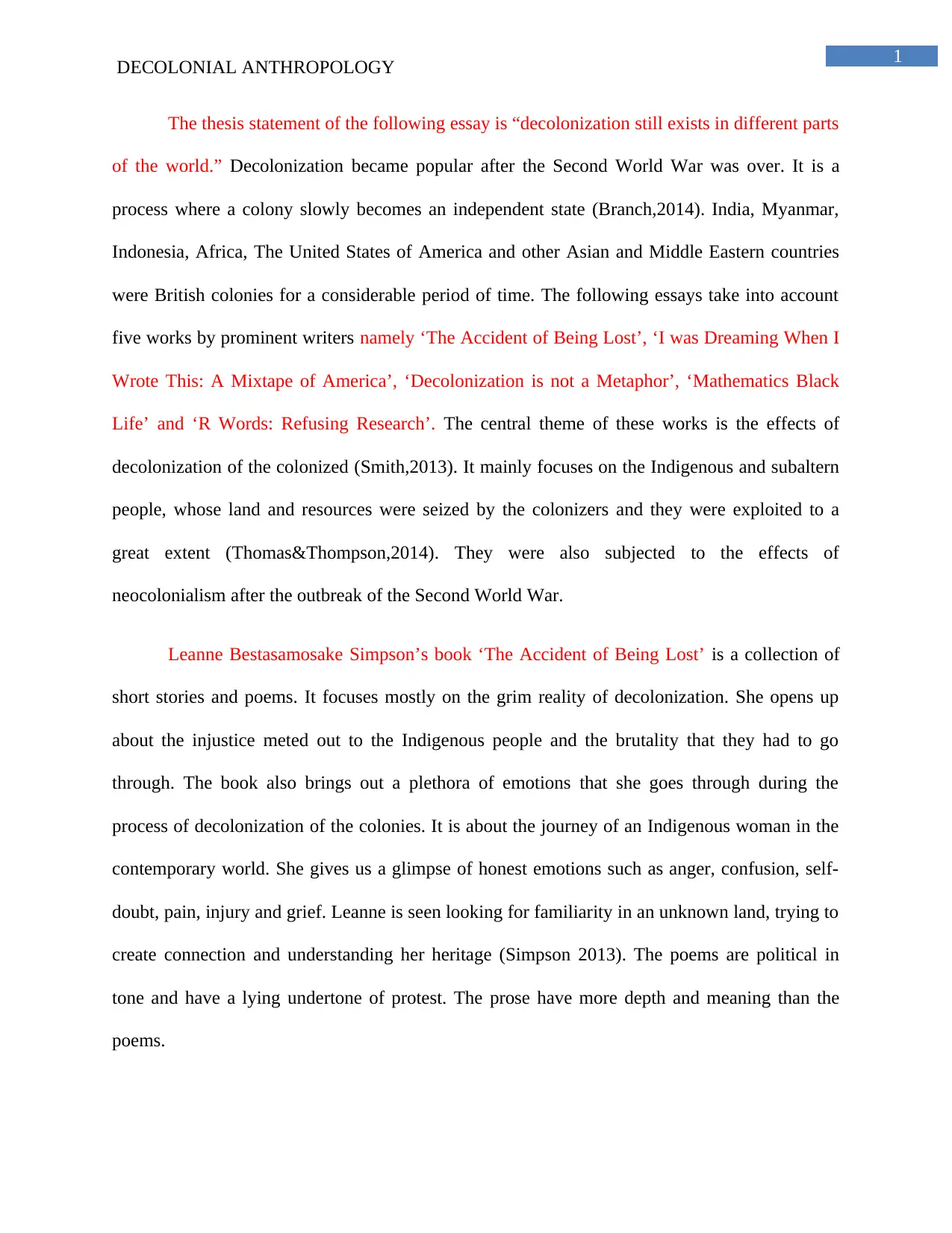
1
DECOLONIAL ANTHROPOLOGY
The thesis statement of the following essay is “decolonization still exists in different parts
of the world.” Decolonization became popular after the Second World War was over. It is a
process where a colony slowly becomes an independent state (Branch,2014). India, Myanmar,
Indonesia, Africa, The United States of America and other Asian and Middle Eastern countries
were British colonies for a considerable period of time. The following essays take into account
five works by prominent writers namely ‘The Accident of Being Lost’, ‘I was Dreaming When I
Wrote This: A Mixtape of America’, ‘Decolonization is not a Metaphor’, ‘Mathematics Black
Life’ and ‘R Words: Refusing Research’. The central theme of these works is the effects of
decolonization of the colonized (Smith,2013). It mainly focuses on the Indigenous and subaltern
people, whose land and resources were seized by the colonizers and they were exploited to a
great extent (Thomas&Thompson,2014). They were also subjected to the effects of
neocolonialism after the outbreak of the Second World War.
Leanne Bestasamosake Simpson’s book ‘The Accident of Being Lost’ is a collection of
short stories and poems. It focuses mostly on the grim reality of decolonization. She opens up
about the injustice meted out to the Indigenous people and the brutality that they had to go
through. The book also brings out a plethora of emotions that she goes through during the
process of decolonization of the colonies. It is about the journey of an Indigenous woman in the
contemporary world. She gives us a glimpse of honest emotions such as anger, confusion, self-
doubt, pain, injury and grief. Leanne is seen looking for familiarity in an unknown land, trying to
create connection and understanding her heritage (Simpson 2013). The poems are political in
tone and have a lying undertone of protest. The prose have more depth and meaning than the
poems.
DECOLONIAL ANTHROPOLOGY
The thesis statement of the following essay is “decolonization still exists in different parts
of the world.” Decolonization became popular after the Second World War was over. It is a
process where a colony slowly becomes an independent state (Branch,2014). India, Myanmar,
Indonesia, Africa, The United States of America and other Asian and Middle Eastern countries
were British colonies for a considerable period of time. The following essays take into account
five works by prominent writers namely ‘The Accident of Being Lost’, ‘I was Dreaming When I
Wrote This: A Mixtape of America’, ‘Decolonization is not a Metaphor’, ‘Mathematics Black
Life’ and ‘R Words: Refusing Research’. The central theme of these works is the effects of
decolonization of the colonized (Smith,2013). It mainly focuses on the Indigenous and subaltern
people, whose land and resources were seized by the colonizers and they were exploited to a
great extent (Thomas&Thompson,2014). They were also subjected to the effects of
neocolonialism after the outbreak of the Second World War.
Leanne Bestasamosake Simpson’s book ‘The Accident of Being Lost’ is a collection of
short stories and poems. It focuses mostly on the grim reality of decolonization. She opens up
about the injustice meted out to the Indigenous people and the brutality that they had to go
through. The book also brings out a plethora of emotions that she goes through during the
process of decolonization of the colonies. It is about the journey of an Indigenous woman in the
contemporary world. She gives us a glimpse of honest emotions such as anger, confusion, self-
doubt, pain, injury and grief. Leanne is seen looking for familiarity in an unknown land, trying to
create connection and understanding her heritage (Simpson 2013). The poems are political in
tone and have a lying undertone of protest. The prose have more depth and meaning than the
poems.
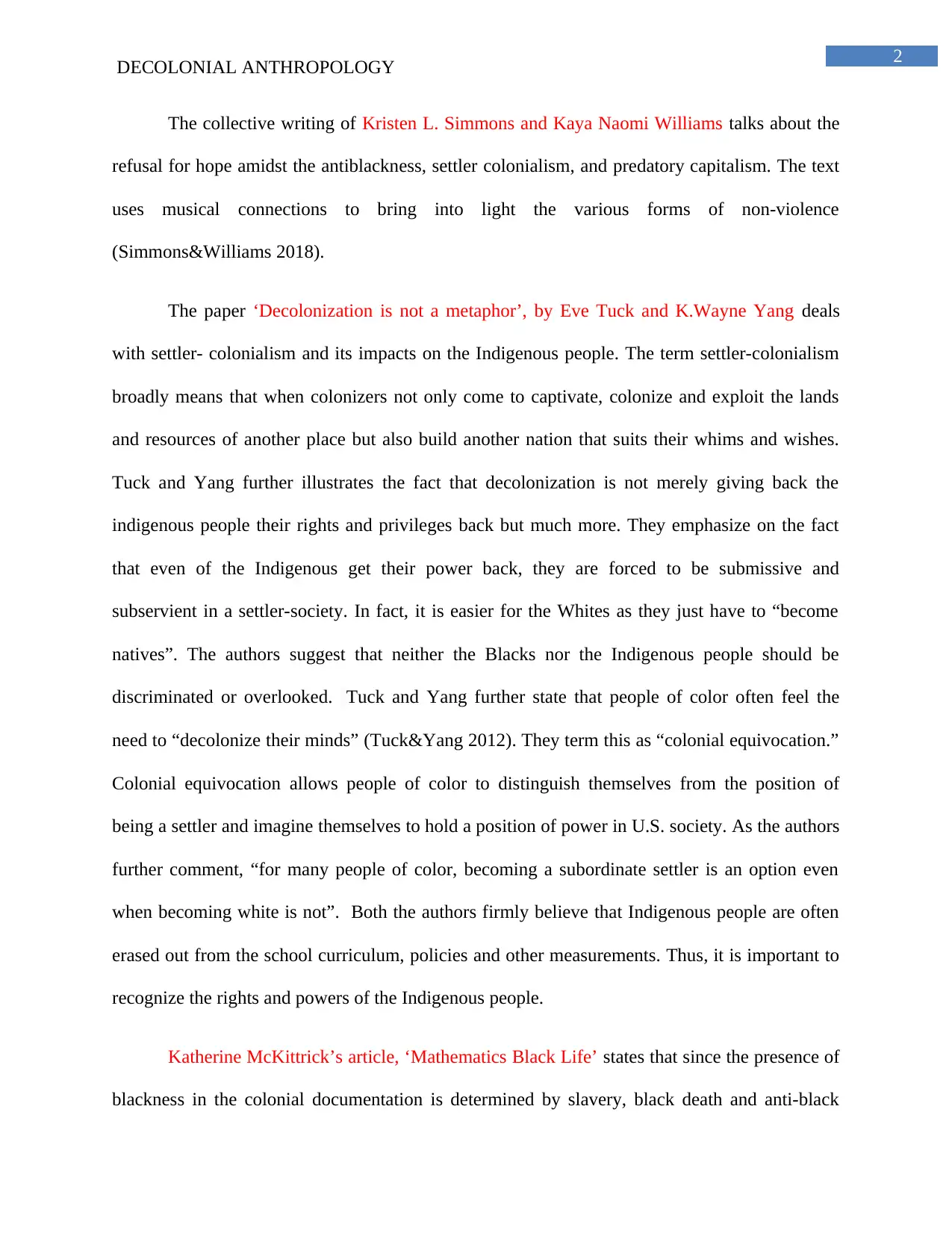
2
DECOLONIAL ANTHROPOLOGY
The collective writing of Kristen L. Simmons and Kaya Naomi Williams talks about the
refusal for hope amidst the antiblackness, settler colonialism, and predatory capitalism. The text
uses musical connections to bring into light the various forms of non-violence
(Simmons&Williams 2018).
The paper ‘Decolonization is not a metaphor’, by Eve Tuck and K.Wayne Yang deals
with settler- colonialism and its impacts on the Indigenous people. The term settler-colonialism
broadly means that when colonizers not only come to captivate, colonize and exploit the lands
and resources of another place but also build another nation that suits their whims and wishes.
Tuck and Yang further illustrates the fact that decolonization is not merely giving back the
indigenous people their rights and privileges back but much more. They emphasize on the fact
that even of the Indigenous get their power back, they are forced to be submissive and
subservient in a settler-society. In fact, it is easier for the Whites as they just have to “become
natives”. The authors suggest that neither the Blacks nor the Indigenous people should be
discriminated or overlooked. Tuck and Yang further state that people of color often feel the
need to “decolonize their minds” (Tuck&Yang 2012). They term this as “colonial equivocation.”
Colonial equivocation allows people of color to distinguish themselves from the position of
being a settler and imagine themselves to hold a position of power in U.S. society. As the authors
further comment, “for many people of color, becoming a subordinate settler is an option even
when becoming white is not”. Both the authors firmly believe that Indigenous people are often
erased out from the school curriculum, policies and other measurements. Thus, it is important to
recognize the rights and powers of the Indigenous people.
Katherine McKittrick’s article, ‘Mathematics Black Life’ states that since the presence of
blackness in the colonial documentation is determined by slavery, black death and anti-black
DECOLONIAL ANTHROPOLOGY
The collective writing of Kristen L. Simmons and Kaya Naomi Williams talks about the
refusal for hope amidst the antiblackness, settler colonialism, and predatory capitalism. The text
uses musical connections to bring into light the various forms of non-violence
(Simmons&Williams 2018).
The paper ‘Decolonization is not a metaphor’, by Eve Tuck and K.Wayne Yang deals
with settler- colonialism and its impacts on the Indigenous people. The term settler-colonialism
broadly means that when colonizers not only come to captivate, colonize and exploit the lands
and resources of another place but also build another nation that suits their whims and wishes.
Tuck and Yang further illustrates the fact that decolonization is not merely giving back the
indigenous people their rights and privileges back but much more. They emphasize on the fact
that even of the Indigenous get their power back, they are forced to be submissive and
subservient in a settler-society. In fact, it is easier for the Whites as they just have to “become
natives”. The authors suggest that neither the Blacks nor the Indigenous people should be
discriminated or overlooked. Tuck and Yang further state that people of color often feel the
need to “decolonize their minds” (Tuck&Yang 2012). They term this as “colonial equivocation.”
Colonial equivocation allows people of color to distinguish themselves from the position of
being a settler and imagine themselves to hold a position of power in U.S. society. As the authors
further comment, “for many people of color, becoming a subordinate settler is an option even
when becoming white is not”. Both the authors firmly believe that Indigenous people are often
erased out from the school curriculum, policies and other measurements. Thus, it is important to
recognize the rights and powers of the Indigenous people.
Katherine McKittrick’s article, ‘Mathematics Black Life’ states that since the presence of
blackness in the colonial documentation is determined by slavery, black death and anti-black
⊘ This is a preview!⊘
Do you want full access?
Subscribe today to unlock all pages.

Trusted by 1+ million students worldwide
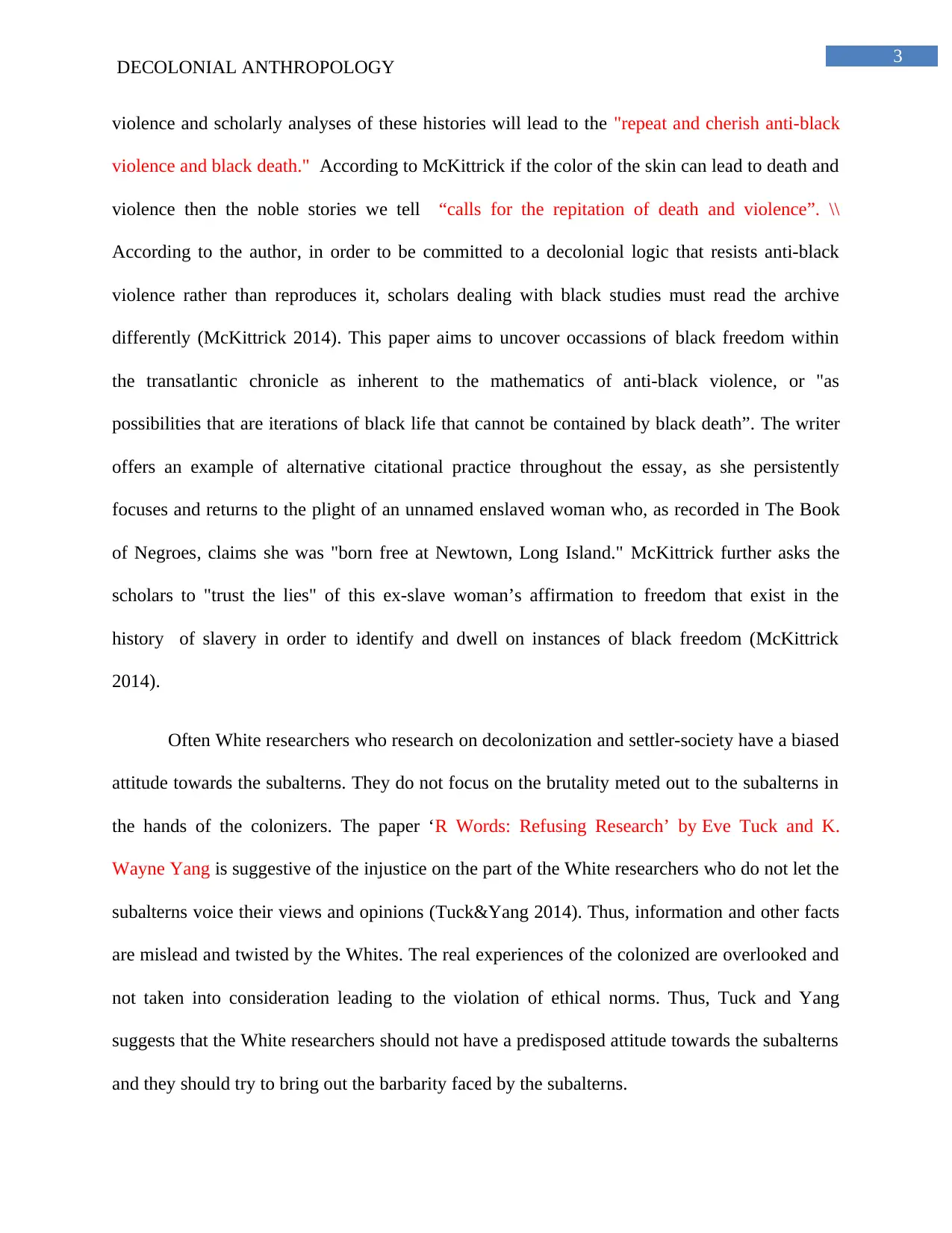
3
DECOLONIAL ANTHROPOLOGY
violence and scholarly analyses of these histories will lead to the "repeat and cherish anti-black
violence and black death." According to McKittrick if the color of the skin can lead to death and
violence then the noble stories we tell “calls for the repitation of death and violence”. \\
According to the author, in order to be committed to a decolonial logic that resists anti-black
violence rather than reproduces it, scholars dealing with black studies must read the archive
differently (McKittrick 2014). This paper aims to uncover occassions of black freedom within
the transatlantic chronicle as inherent to the mathematics of anti-black violence, or "as
possibilities that are iterations of black life that cannot be contained by black death”. The writer
offers an example of alternative citational practice throughout the essay, as she persistently
focuses and returns to the plight of an unnamed enslaved woman who, as recorded in The Book
of Negroes, claims she was "born free at Newtown, Long Island." McKittrick further asks the
scholars to "trust the lies" of this ex-slave woman’s affirmation to freedom that exist in the
history of slavery in order to identify and dwell on instances of black freedom (McKittrick
2014).
Often White researchers who research on decolonization and settler-society have a biased
attitude towards the subalterns. They do not focus on the brutality meted out to the subalterns in
the hands of the colonizers. The paper ‘R Words: Refusing Research’ by Eve Tuck and K.
Wayne Yang is suggestive of the injustice on the part of the White researchers who do not let the
subalterns voice their views and opinions (Tuck&Yang 2014). Thus, information and other facts
are mislead and twisted by the Whites. The real experiences of the colonized are overlooked and
not taken into consideration leading to the violation of ethical norms. Thus, Tuck and Yang
suggests that the White researchers should not have a predisposed attitude towards the subalterns
and they should try to bring out the barbarity faced by the subalterns.
DECOLONIAL ANTHROPOLOGY
violence and scholarly analyses of these histories will lead to the "repeat and cherish anti-black
violence and black death." According to McKittrick if the color of the skin can lead to death and
violence then the noble stories we tell “calls for the repitation of death and violence”. \\
According to the author, in order to be committed to a decolonial logic that resists anti-black
violence rather than reproduces it, scholars dealing with black studies must read the archive
differently (McKittrick 2014). This paper aims to uncover occassions of black freedom within
the transatlantic chronicle as inherent to the mathematics of anti-black violence, or "as
possibilities that are iterations of black life that cannot be contained by black death”. The writer
offers an example of alternative citational practice throughout the essay, as she persistently
focuses and returns to the plight of an unnamed enslaved woman who, as recorded in The Book
of Negroes, claims she was "born free at Newtown, Long Island." McKittrick further asks the
scholars to "trust the lies" of this ex-slave woman’s affirmation to freedom that exist in the
history of slavery in order to identify and dwell on instances of black freedom (McKittrick
2014).
Often White researchers who research on decolonization and settler-society have a biased
attitude towards the subalterns. They do not focus on the brutality meted out to the subalterns in
the hands of the colonizers. The paper ‘R Words: Refusing Research’ by Eve Tuck and K.
Wayne Yang is suggestive of the injustice on the part of the White researchers who do not let the
subalterns voice their views and opinions (Tuck&Yang 2014). Thus, information and other facts
are mislead and twisted by the Whites. The real experiences of the colonized are overlooked and
not taken into consideration leading to the violation of ethical norms. Thus, Tuck and Yang
suggests that the White researchers should not have a predisposed attitude towards the subalterns
and they should try to bring out the barbarity faced by the subalterns.
Paraphrase This Document
Need a fresh take? Get an instant paraphrase of this document with our AI Paraphraser
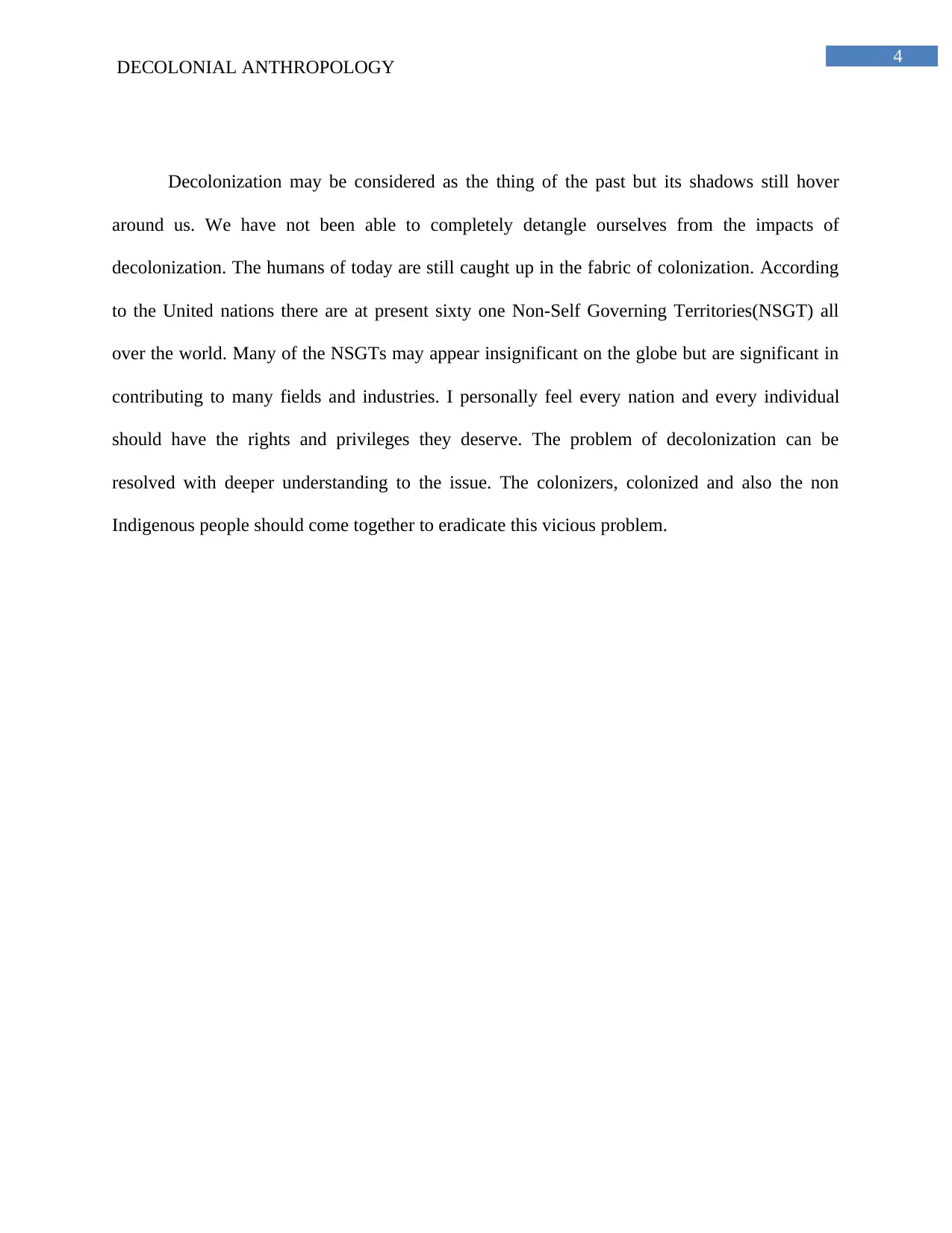
4
DECOLONIAL ANTHROPOLOGY
Decolonization may be considered as the thing of the past but its shadows still hover
around us. We have not been able to completely detangle ourselves from the impacts of
decolonization. The humans of today are still caught up in the fabric of colonization. According
to the United nations there are at present sixty one Non-Self Governing Territories(NSGT) all
over the world. Many of the NSGTs may appear insignificant on the globe but are significant in
contributing to many fields and industries. I personally feel every nation and every individual
should have the rights and privileges they deserve. The problem of decolonization can be
resolved with deeper understanding to the issue. The colonizers, colonized and also the non
Indigenous people should come together to eradicate this vicious problem.
DECOLONIAL ANTHROPOLOGY
Decolonization may be considered as the thing of the past but its shadows still hover
around us. We have not been able to completely detangle ourselves from the impacts of
decolonization. The humans of today are still caught up in the fabric of colonization. According
to the United nations there are at present sixty one Non-Self Governing Territories(NSGT) all
over the world. Many of the NSGTs may appear insignificant on the globe but are significant in
contributing to many fields and industries. I personally feel every nation and every individual
should have the rights and privileges they deserve. The problem of decolonization can be
resolved with deeper understanding to the issue. The colonizers, colonized and also the non
Indigenous people should come together to eradicate this vicious problem.
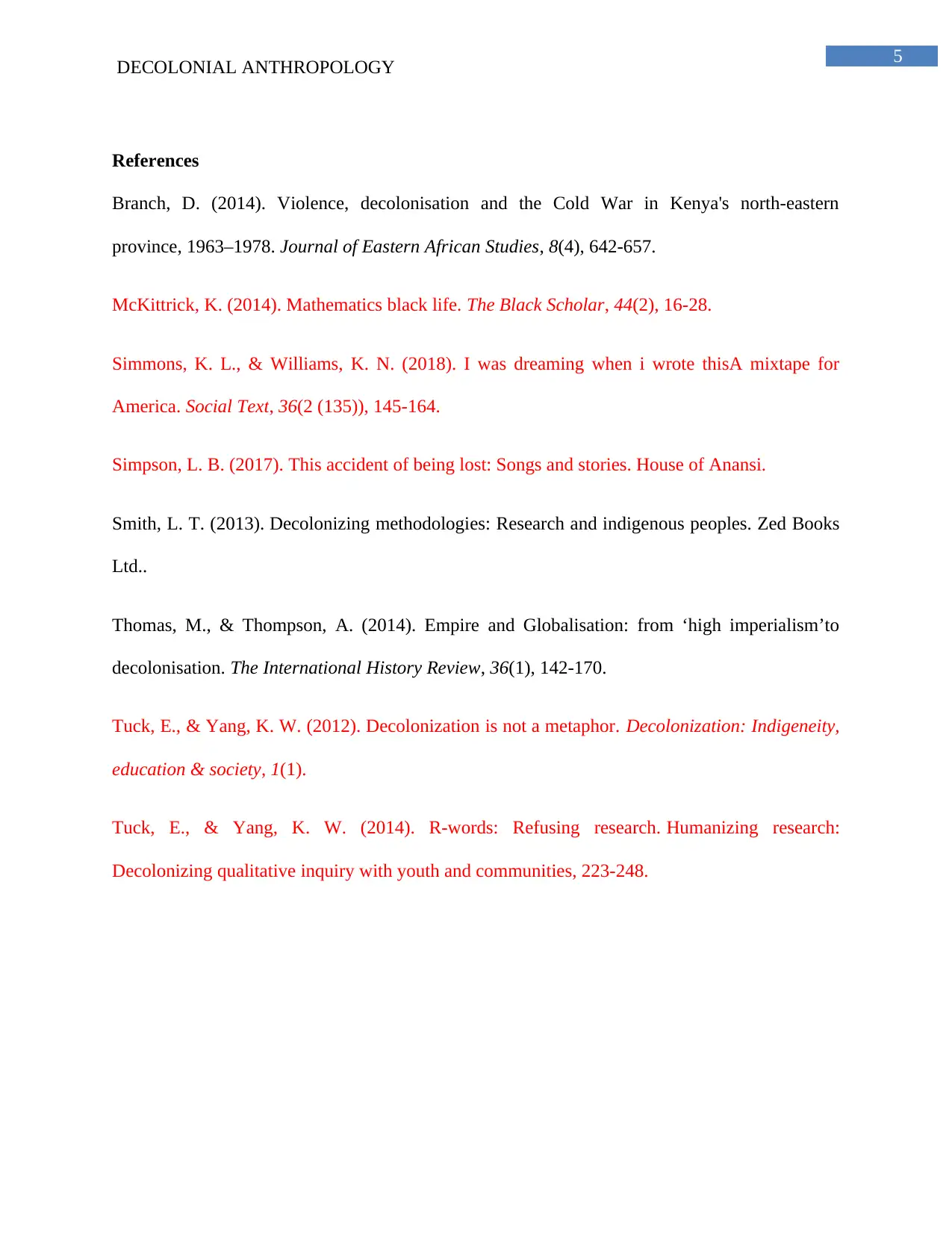
5
DECOLONIAL ANTHROPOLOGY
References
Branch, D. (2014). Violence, decolonisation and the Cold War in Kenya's north-eastern
province, 1963–1978. Journal of Eastern African Studies, 8(4), 642-657.
McKittrick, K. (2014). Mathematics black life. The Black Scholar, 44(2), 16-28.
Simmons, K. L., & Williams, K. N. (2018). I was dreaming when i wrote thisA mixtape for
America. Social Text, 36(2 (135)), 145-164.
Simpson, L. B. (2017). This accident of being lost: Songs and stories. House of Anansi.
Smith, L. T. (2013). Decolonizing methodologies: Research and indigenous peoples. Zed Books
Ltd..
Thomas, M., & Thompson, A. (2014). Empire and Globalisation: from ‘high imperialism’to
decolonisation. The International History Review, 36(1), 142-170.
Tuck, E., & Yang, K. W. (2012). Decolonization is not a metaphor. Decolonization: Indigeneity,
education & society, 1(1).
Tuck, E., & Yang, K. W. (2014). R-words: Refusing research. Humanizing research:
Decolonizing qualitative inquiry with youth and communities, 223-248.
DECOLONIAL ANTHROPOLOGY
References
Branch, D. (2014). Violence, decolonisation and the Cold War in Kenya's north-eastern
province, 1963–1978. Journal of Eastern African Studies, 8(4), 642-657.
McKittrick, K. (2014). Mathematics black life. The Black Scholar, 44(2), 16-28.
Simmons, K. L., & Williams, K. N. (2018). I was dreaming when i wrote thisA mixtape for
America. Social Text, 36(2 (135)), 145-164.
Simpson, L. B. (2017). This accident of being lost: Songs and stories. House of Anansi.
Smith, L. T. (2013). Decolonizing methodologies: Research and indigenous peoples. Zed Books
Ltd..
Thomas, M., & Thompson, A. (2014). Empire and Globalisation: from ‘high imperialism’to
decolonisation. The International History Review, 36(1), 142-170.
Tuck, E., & Yang, K. W. (2012). Decolonization is not a metaphor. Decolonization: Indigeneity,
education & society, 1(1).
Tuck, E., & Yang, K. W. (2014). R-words: Refusing research. Humanizing research:
Decolonizing qualitative inquiry with youth and communities, 223-248.
⊘ This is a preview!⊘
Do you want full access?
Subscribe today to unlock all pages.

Trusted by 1+ million students worldwide
1 out of 6
Your All-in-One AI-Powered Toolkit for Academic Success.
+13062052269
info@desklib.com
Available 24*7 on WhatsApp / Email
![[object Object]](/_next/static/media/star-bottom.7253800d.svg)
Unlock your academic potential
Copyright © 2020–2025 A2Z Services. All Rights Reserved. Developed and managed by ZUCOL.